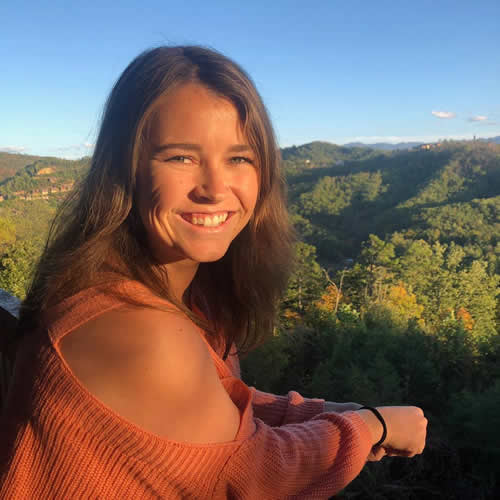SESSION 1: 10:00 AM -11:30 AM
Panel B: To Be or Not To Be: Who is a Citizen, and What Does it Mean?
C100 Hesburgh Center Auditorium
Moderator: Ilaria Schnyder von Wartensee

NGOs and Refugee Resettlement
Alex Lloyd, University of Notre Dame
Abstract
Who holds the power in the refugee resettlement process? Since World War II, humanitarian efforts carried out by nongovernmental organizations (NGOs) have increased in prevalence and impact, especially within refugee resettlement in the United States. Using a framework of Critical Refugee Studies theory, this research investigates the power dynamics within refugee resettlement. Through a case study of NGOs working with resettled refugees in St. Louis, this project analyzes specific NGO initiatives and explores the relationship between these agencies and government policy and their impact on the lives of refugees. Understanding the actors that control resettlement can illuminate how refugees navigate the power structures within humanitarianism, international relations, and sites of resettlement.
Political Will and Statelessness
Cassandra Anzalone, University of Notre Dame
Abstract
What are the effects of different approaches to handling statelessness within the international system? Current literature on statelessness is incomplete as it predominatelyconsists of reports and articles that lack analysis from the United Nations or the United Nations High Commissioner for Refugees. This results in a gap in the discourse regarding the options state leaders have to naturalize stateless persons. By looking at case reports I found that states with more political will, or desire to change their discriminatory legal code, had more successful naturalization plans than states with weaker political will. Domestic governments with minimal interest in changing their citizenship policies, delayed each step of the registration process, leading to registration plans that saw limited success. I will test the relevance of political will to the success of a case through comparisons of three case studies where the states had either full or no political will and either none, partial or full success. The impact of political will on the success of a case will illuminate the necessary precondition(s) for success. This will provide further insight into when it is most beneficial for a state to start a naturalization campaign and how they should register stateless groups.

Trump’s Wall: a philosophical analysis into the physical and the virtual
Mary Kate O’Leary, University of Notre Dame
Abstract
We exist both virtually and physically: lives which frequently intersect and spill into one another. While this phenomenon is in no way new, it is fundamentally unique in our digitized world oversaturated with virtual media. Trump’s Border Wall is in various stages of construction, therefore not existing physically; yet, my research argues that the Wall is very much Real by merit of its virtual existence. While it may not exist in brick and mortar, Trump’s Wall still has a presence and a shadow.
Relying on 20th century philosophy, specifically Jean Baudrillard’s Simulation and Simulacra and Elaine Scarry’s The Body in Pain , I investigate definitions of Reality provided throughout recent history. Soshana Zuboff’s revolutionary book, The Age of Surveillance Capitalism , makes these questions of virtuality, physicality and self sovereignty much more personal. Her work allows me to reimagine my other foundational sources and consider the consequences of our increasingly digitized age.
My thesis culminates in an analysis of the virtual asylum hearings currently taking place in Laredo, Texas under the Trump Administration. A final analysis of the migrant experience in Laredo provides a concrete basis for these metaphysical questions and a chance to look at migration from a philosophical perspective. I consider how those who exist virtually appear to have more of a right to exist physically, on both sides of the Wall. Ultimately, Trump’s Wall (and the way we interact with it) is both a perfect case study of these existences coming into conflict and a cautionary tale about what we have to lose in the process.
Studying Variation in Migrant Expectations: An Analysis of the Isthmus of America
Ignacia Ulloa Peters, University of Notre Dame
Abstract
Around the world, immigrants are often left stranded, unable to reach their destination, due to the lack of information available at the time of deciding to migrate. Other times, they reach it only to become faced with greater hardships and worse conditions than those they were persuaded to believe by certain information sources. Nevertheless, most NGOs focus primarily
on remediating the effects of the challenges rather than the sources, rendering their solutions temporary. Without adequate procedures to help migrants make informed decisions, the problem of stranded, non-assimilated immigrants will only continue to perpetuate itself. It is important that scholars and policy makers “understand the pre-migration values and expectations because they shape the way migrants adjust to and develop new cultural patterns in the receiving countries” (Sladkova, 2007, p. 187) . I partnered with the International Organization for Migrants (IOM) starting mid-May. With their support, I propose to interview fifty immigrants who are either migrating from, or in transit through Costa Rica, about the perceptions of their future journey in order to analyze what explains variations in expectations, as to better understand the effect that information sources (or lack thereof) have on the decision to migrate.





